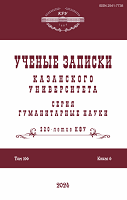Взгляды Мусы Бигиева на форму исламского государства
Musa Bigiev’s Perspective on the Form of the Islamic State
Author(s): D. R. ZaynutdinovSubject(s): Law, Constitution, Jurisprudence, Islam studies, Religion and science , Sociology of Law, Sharia Law
Published by: Казанский (Приволжский) федеральный университет
Keywords: form of state; secular state; theocratic state; fiqh; Islamic state; caliphate; Musa Bigiev;
Summary/Abstract: This article examines the form of the Islamic state, comparing it with the classification accepted in continental jurisprudence and drawing parallels with secular and theocratic state models. It emphasizes that Islamic jurisprudence (fiqh) does not recognize certain structural elements, such as government, territorial organization, and political regime. Instead, the above elements represent a single category, with the caliphate as the ultimate state form. Musa Bigiev (1874–1949), a prominent Tatar theologian, philosopher, and lawyer, extensively studied the caliphate as a form of the Islamic state. His scholarly works focus on the Sunni and Shia concepts of the caliphate, the general principles of governance, as well as other critical aspects determining the essence of the Islamic state. Based on a comprehensive analysis of Musa Bigiev’s thoughts, the need to define the exact form of the Islamic state is demonstrated and justified.
Journal: Ученые записки Казанского университета. Серия Гуманитарные науки
- Issue Year: 166/2024
- Issue No: 6
- Page Range: 72-83
- Page Count: 12
- Language: Russian

